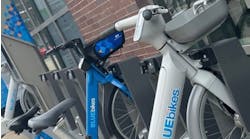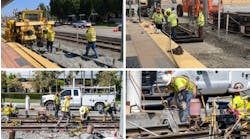Paid Parking Planned for Metro Red Line North Hollywood Station and Universal City Station
As part of Los Angeles County Metropolitan Transportation Authority's (Metro) Parking Management Pilot Program approved by the Los Angeles County Metropolitan Transportation Authority Board of Directors last December, paid parking will go into operation on Monday, April 24, at both the Metro Red Line North Hollywood and Universal City stations.
The paid parking requirement is being implemented to better manage demand for parking at two very busy Red Line subway stations and create more parking spaces for transit riders. Metro will begin charging $3 a day to park at the two Red Line stations. Both lots have provided free parking since opening in 2000.
Over the years, it has become more challenging for transit riders to find parking at either station unless they arrive very early on weekday mornings. One problem is that a number of non-Metro riders use the lots to park for free, meaning those who want to park-and-ride are left without a space.
Automated parking systems will be used at each station. There will be Metro ambassadors on hand during the first few weeks to help riders get used to paying. Parking patrons will be able to pay either at parking machines located around both lots or via a Metro Parking mobile application on their smartphones that can be downloaded from Google Play or the Apple Store. The mobile application will be available for download on April 24.
To park at the stations:
- Find a parking space and pay with the app or find the nearest pay machine. You will need both your license plate number and a valid Metro TAP card. The app requires a credit card. The machines will accept cash or credit cards. New transit riders will be given a one-day grace period to get a TAP card, which are available at TAP vending machines at both stations.
- Upon entering the parking lots, cameras will take a picture of the license plate on each vehicle and the payment system will use the license plates to verify that payment was received. The cameras also make the system more convenient as there's no need to return to your car after paying to put a receipt on the dashboard.
- The $3 fee covers 24 hours of parking. You can park at either station for up to three days at $3 per day. Failure to pay will result in a citation of $53.
- Existing monthly permit holders will have their permits automatically converted to the new system. The cost for the monthly permit is $55 for Universal City Station and $59 for North Hollywood. The same site also offers carpool parking permits at a discount of $45 per month that allows patrons to split the cost of a monthly permit between two or three people.
- Monthly permit holders will be required to demonstrate, at a minimum, 10 daily ridership transactions per month using a TAP card. Monthly parking permit holders with less than six transactions by the 15th of the month will receive an e-mail reminder. If they do not maintain this requirement, the monthly parking permit will not be renewed.
In implementing the program at other rail stations, Metro has found that a small daily fee along with the TAP card requirement opens up parking spaces and helps prevent the need to build additional parking facilities.
As an example, with a daily fee of $3 in place at all Metro-owned lots along the Expo Line, there remains spaces open in each of those lots — even with the Culver City lot having recently closed to accommodate a new development to be built there. Now transit users of the Expo Line can be fairly certain they will get a space.
The North Hollywood Station has more than 1,000 parking spaces and Universal City has nearly 550 spaces. In addition, parking lots along the Orange Line — which offers a transfer to the Red Line at the North Hollywood Station — will remain free as those lots are currently under-utilized with about 27 percent of spaces occupied on the average day.


